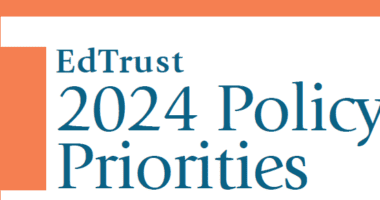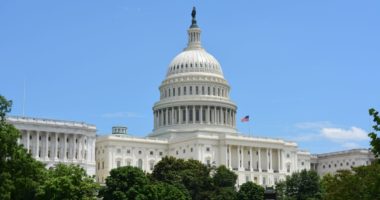“Congress should continue — as it has done every year — to reject this administration’s destructive proposal and seek to move closer to educational justice”
Statement from President and CEO John B. King Jr. on Trump Administration’s FY20 Budget Proposal
“It should come as no surprise that the Trump administration once again tries to push the American Dream further out of reach by putting forth an unrealistic and harmful budget proposal that undermines the interests of students and educators in classrooms across our nation. Cutting federal education spending to the tune of $8.5 billion while allowing other vital programs to stagnate that increase college affordability and provide extra support to low-income schools and districts is the message we have come to expect from this administration.”
“Congress should continue — as it has done every year — to reject this administration’s destructive proposal and seek to move closer to educational justice by reaching a budget deal that allows the federal government to meaningfully invest in supports and programs that provide more resources, not fewer, to students from low-income backgrounds and students of color.”
Ed Trust hopes the following areas will be a priority for Congress in fiscal year 2020:
- More than 7.5 million students in America receive a Pell Grant to afford a college education. Instead of increasing Pell’s purchasing power, the Trump administration has chosen to drain the Pell Grant reserves and expand eligibility to short-term programs without meaningful quality guardrails, which research and experience have shown will provide little value to students.
- As educators and school staff continue to protest chronic disinvestment in public education, the Trump administration shows blatant disregard for their needs in the classroom by cutting Title II dollars, which support professional development and continuous learning opportunities. These funds should be maintained and increased — particularly in areas like helping teachers to better address the needs of English learners and expanding access to computer science and other STEM fields — so teachers can continue to better prepare our nation’s students for college and careers.
- Students deserve access to high-quality educational opportunities, both during and after school hours. The budget eliminates many programs in the bipartisan Every Student Succeeds Act designed to provide additional opportunities for a well-rounded education, including the 21st Century Community Learning Center program and the Student Support and Academic Enrichment Grant program, which provide after-school and summer programs and enrich instruction and student supports, respectively.
- A college education remains the surest path to social mobility and is made more accessible to low-income students through programs like TRIO and Gaining Early Awareness and Readiness for Undergraduate Programs (GEAR UP), which provide academic supports and counseling to students beginning in high school and through higher education. The budget would eliminate GEAR UP and make less funding available via TRIO to low-income students and students of color (who make up a substantial proportion of students served by these programs) which will only serve to threaten their opportunity to achieve the American Dream and exacerbate racial and socioeconomic gaps in college matriculation and completion.
- The budget would cut the Federal Work-Study program, which helps low-income students afford higher education and gain work experience, by approximately half and eliminate subsidized loans, which allow undergraduate students to pursue a college education without accruing interest toward their federal student loans.
- States, which all too frequently underfund public education in the most underserved schools and districts, are implementing the bipartisan Every Student Succeeds Act and now beginning to take steps to intervene in schools identified as struggling under their new accountability systems. Instead of increasing funding for Title I to make evidence-based investments in students and schools that need more resources, the Trump administration proposes $5 billion to subsidize a private school voucher scheme in FY20. This presents a significant missed opportunity by the Trump administration to set an example for states about how to invest in students and schools that need more well invested resources, not fewer.
- Lastly, as Congress works to reauthorize the Higher Education Act, we firmly believe that colleges and universities should be held accountable for how they serve (or fail to serve) students. However, any accountability system must be thoughtfully designed to ensure already under-resourced institutions are not penalized for historic disinvestment and remove any federal incentives that might shut out low-income students or students of color from accessing higher education. Thus, any risk-sharing proposal or other higher education accountability system must be designed through an equity lens, accounting for how institutions enroll and support historically underrepresented students to and through higher education.
###






